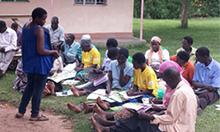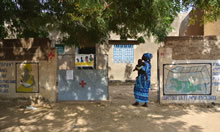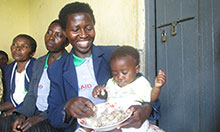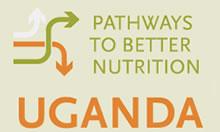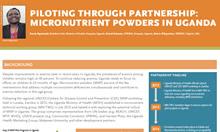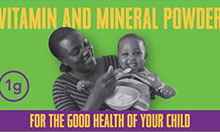Micronutrient powders help reduce iron and vitamin deficiencies among young children

A Young Child’s Nutrition Suffers
When Whitney was just a year old, he was abandoned by his mother and taken in by his grandmother, Zewelensi. Although an average one-year-old can sit up on his or her own, walk, and even say a few words, Whitney could not.
“He was thin. His eyes were yellow. It looked like his neck was too weak to hold his head and his appetite was very poor. He did not play with anything or anyone. When other children tried to play with him, he looked on uninterested,” said Zewelensi. She added, “He couldn’t even smile.”
Micronutrient Powders Help Young Children Thrive
His grandmother didn’t realize it at the time, but Whitney was anemic and malnourished. Shortly after taking him under her care, village health teams (VHTs), working with support from SPRING/Uganda, visited her home and, after examining Whitney, found that he wasn’t getting the necessary mix of nutrients he needed for proper development. They explained that, in addition to a diverse diet, micronutrient powders (MNP) could give Whitney with the vitamins and minerals he needed.
Within three months of giving him food mixed with MNP, I could see a difference—my grandson’s appetite improved greatly. My problems shifted from pleading with him to eat to making sure there was enough food for him to eat, especially during the drought.
-Zewelensi, grandmother and MNP advocate
Whitney is not alone; 60 percent of children in the Busoga region in Uganda’s Namutumba District suffer from malnutrition. SPRING, which applies a multi-sectoral approach to reduce stunting and anemia, helped the Ugandan Ministry of Health pilot the rollout MNP sachet distribution in both health facilities and through VHTs to reach over 22,000 children in the district over a nine-month period. Each one-gram sachet provides a day's worth of 15 essential vitamins and nutrients and is proven to reduce iron deficiency and anemia. Mixed into the food of children 6- 23 months old, MNP can provide proper nutrition in the critical 1,000-day window between pregnancy and a child’s second birthday in areas where micro- deficient diets are prevalent.

VHTs identified all eligible children throughout the district, then provided counseling for their caretakers about the benefits and proper use of MNP as well as infant and young child feeding (IYCF) best practices. The VHTs also provided caretakers with MNP packets. “The VHT said that I should add the powders to his food and that they would help him become healthier. My worries about the powders making his poor appetite even worse went away quickly.”
A Little Boy Learns to Play
In Whitney’s case, the results were dramatic; after three months of taking MNP, he was strong and healthy, had an eager appetite, and could walk, run, and play with other children.
According to Jennifer, a nurse at Magada Health Centre III, “The vitamin powders have made children who access services at our facility healthier. Many mothers noticed a change within the first few weeks. That is why most of them came back to get refills.”
SPRING is studying the differences between how MNP are received and taken when distributed in health facilities versus through VHTs. The findings will help the Ministry of Health better target MNP distribution for maximum impact of this promising intervention to reduce malnutrition.
Whitney is now two years old and no longer needs MNP. His grandmother reports he has sustained good health and rarely gets sick like he did when he was younger. She is enthusiastic about sharing her family's story in the hopes that others will learn about the benefits of MNP.
“The VHT in our area knows a lot about the MNP and nutrition in general. We learned a lot about eating healthy. I also apply the knowledge when planning meals for the rest of the family,” Zewelensi said.
SPRING/Uganda directly supports activities and policies to reduce stunting, micronutrient deficiencies, and anemia. In addition to the MNP program in the Namutumba District, SPRING’s approaches include large-scale food fortification, multi-sectoral coordination, and national-level social and behavior change communication.
